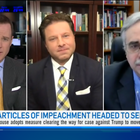Experts Matter. Find Yours.
Connect for media, speaking, professional opportunities & more.

Poll finds bipartisan agreement on a key issue: Regulating AI
This article is republished from The Conversation under a Creative Commons license. Read the original article here. In the run-up to the vote in the U.S. Senate on President Donald Trump’s spending and tax bill, Republicans scrambled to revise the bill to win support of wavering GOP senators. A provision included in the original bill was a 10-year moratorium on any state law that sought to regulate artificial intelligence. The provision denied access to US$500 million in federal funding for broadband internet and AI infrastructure projects for any state that passed any such law. The inclusion of the AI regulation moratorium was widely viewed as a win for AI firms that had expressed fears that states passing regulations on AI would hamper the development of the technology. However, many federal and state officials from both parties, including state attorneys general, state legislators and 17 Republican governors, publicly opposed the measure. In the last hours before the passage of the bill, the Senate struck down the provision by a resounding 99-1 vote. In an era defined by partisan divides on issues such as immigration, health care, social welfare, gender equality, race relations and gun control, why are so many Republican and Democratic political leaders on the same page on the issue of AI regulation? Whatever motivated lawmakers to permit AI regulation, our recent poll shows that they are aligned with the majority of Americans who view AI with trepidation, skepticism and fear, and who want the emerging technology regulated. Bipartisan sentiments We are political scientists who use polls to study partisan polarization in the United States, as well as the areas of agreement that bridge the divide that has come to define U.S. politics. In April 2025, we fielded a nationally representative poll that sought to capture what Americans think about AI, including what they think AI will mean for the economy and society going forward. The public is generally pessimistic. We found that 65% of Americans said they believe AI will increase the spread of false information. Fifty-six percent of Americans worry AI will threaten the future of humanity. Fewer than 3 in 10 Americans told us AI will make them more productive (29%), make people less lonely (21%) or improve the economy (22%). While Americans tend to be deeply divided along partisan lines on most issues, the apprehension regarding AI’s impact on the future appears to be relatively consistent across Republicans and Democrats. For example, only 19% of Republicans and 22% of Democrats said they believe that artificial intelligence will make people less lonely. Respondents across the parties are in lockstep when it comes to their views on whether AI will make them personally more productive, with only 29% − both Republicans and Democrats − agreeing. And 60% of Democrats and 53% Republicans said they believe AI will threaten the future of humanity. On the question of whether artificial intelligence should be strictly regulated by the government, we found that close to 6 in 10 Americans (58%) agree with this sentiment. Given the partisan differences in support for governmental regulation of business, we expected to find evidence of a partisan divide on this question. However, our data finds that Democrats and Republicans are of one mind on AI regulation, with majorities of both Democrats (66%) and Republicans (54%) supporting strict AI regulation. When we take into account demographic and political characteristics such as race, educational attainment, gender identity, income, ideology and age, we again find that partisan identity has no significant impact on opinion regarding the regulation of AI. State of anxiety In the years ahead, the debate over AI and the government’s role in regulating it is likely to intensify, on both the state and federal levels. As each day seems to bring new advances in AI’s capability and reach, the future is shaping up to be one in which human beings coexist – and hopefully flourish – alongside AI. This new reality has made the American public, both Democrats and Republicans, justifiably nervous, and our polling captures this widespread trepidation. Lawmakers and technology leaders alike could address this anxiety by better communicating the pitfalls and potential of AI, and take seriously the concerns of the public. After all, the public is not alone in its trepidation. Many experts in the field also have substantial worries about the future of AI. One of the fundamental political questions moving forward, then, will be to what degree regulators put guardrails on this emerging and transformative technology in order to protect Americans from AI’s negative consequences. Adam Eichen is a doctoral candidate in political science at UMass Amherst. Alexander Theodoridis is associate professor of political science and co-director of the UMass Amherst Poll at UMass Amherst. Sara M. Kirshbaum is a postdoctoral fellow and lecturer of political science at UMass Amherst. Tatishe Nteta is provost professor of political science and director of the UMass Amherst Poll at UMass Amherst.

If anyone thought 2020 was going to come in quietly – that theory was likely proven wrong in less than a week. With the DNC primaries in high gear, impeachment trials with testimonies, witnesses and wall to wall rhetoric and now 2nd Amendment rallies capturing national attention in Virginia – political reporters are being pulled in many different directions, and all at the same time it seems. Dr. Stephen Farnsworth is a sought-after political commentator on subjects ranging from presidential politics to the local Virginia congressional races. He has been widely featured in national media, including The Washington Post, Reuters, The Chicago Tribune and MSNBC. He is author or co-author of multiple books on presidential communication. His latest work, "Late Night with Trump - Political Humor and the American Presidency," examines how the treatment of President Trump differs from previous presidents, and how the Trump era is likely to shape the future of political humor. He recently delivered an invited lecture entitled, “A Review of the 2019 Virginia Midterm Elections and a Preview of the 2020 Legislative Session,” at the Virginia Executive Institute Alumni Association Meeting in Chesterfield, VA. An expert on more than just state politics, Farnsworth has also been recently contacted by national and international media for his keen perspective and expert opinion on political matters that are affecting issues across all of America. Dr. Farnsworth is available to speak with media – simply click on his icon to arrange an interview today.

2020 is going to be the year of politics – let Stephen Farnsworth be the expert you call first when you’re covering it. Like the final act in a great Shakespearean play – 2020 looks to be a year of tragedy, irony, comedy and intrigue. We can expect betrayal, vengeance, protagonists, antagonists, heroes and villains. With impeachment hearings, the DNC primaries, summer conventions, trade deals and the election that promises to be an epic display of speeches and stumping as well as vicious and vitriolic attacks. Dr. Stephen Farnsworth is a sought-after political commentator on subjects ranging from presidential politics to the local Virginia congressional races. He has been widely featured in national media, including The Washington Post, Reuters, The Chicago Tribune and MSNBC. He is author or co-author of six books on presidential communication. His latest work, 'Late Night with Trump Political Humor and the American Presidency' shows how late-night political humor, have responded to the Trump presidency. Employing a dataset of more than 100,000 late night jokes going back decades, Farnsworth and S. Robert Lichter discuss how the treatment of Trump differs from previous presidents, and how the Trump era is likely to shape the future of political humor. Stephen is available to speak with media – simply click on his icon to arrange an interview today.

Why is it so hard to pass laws to regulate guns in America? Let our experts explain
So far this year in the United States, there have been eight mass shootings taking the lives of more than 60 people. It’s tragic, but the concept of taking action to remedy this problem is still seen more as political than proactive. In fact, the possibility of being caught up in gun violence is now a part of the everyday lives of a majority of Americans. “Today, 59% of Americans say random acts of violence, like mass shootings, pose the biggest safety threat to them, according to a Reuters/Ipsos poll conducted this month after 31 people were killed in back-to-back rampages in El Paso, Texas, and Dayton, Ohio. The poll also found that 78% of Americans believe another such attack will likely unfold in the next three months. So far this year, there have been more than 250 mass shootings, according to the Gun Violence Archive, a widely cited non-profit that counts incidents in which at least four people other than the shooter were injured or killed.” TIME, Aug. 13, 2019 It is almost baffling why there are bottlenecks and roadblocks to finding a solution – and there are lots of questions that need to be asked. Why don’t national lawmakers pass laws regarding gun violence/mass shooting? How has public opinion changed on gun control in the last 30 years? How does gun violence in the U.S. compare to other countries? What is the current state of gun control laws in the U.S.? If you need answers, that’s where our experts can help. Dr. Gregg R. Murray, professor of political science at Augusta University, is available to talk about why lawmakers are having such a tough time tackling gun violence in America. Murray’s research focuses on political behavior and psychology with specific interests in voter mobilization and turnout. He is also executive director of the Association for Politics and the Life Sciences.

Is this fall’s Virginia election the canary in the coal mine for gun control?
There will be a lot of eyes on Virginia as voters go to the polls to elect its state government this November. Virginia is just one of four states going to the polls this year and it seems like gun-control (or various forms of it) might be a key issue. In fact, Republican Tim Hugo has flip-flopped and is now favoring a Republican drafted “red flag” gun bill that would remove guns from some people considered a risk to themselves or others. Stephen J. Farnsworth, a political science professor at the University of Mary Washington in Fredericksburg, said suburban Republicans like Hugo and Miyares are walking a fine line on volatile issues like gun control as Democrats make inroads in those communities. Those Republicans in moderate areas feel pressure to side with their party in larger political battles, such as the one that occurred in Richmond last month, when the GOP leaders abruptly ended the special session. But they also can’t appear to be out of sync with their changing districts on guns and other divisive topics, Farnsworth said. “Delegate Hugo has to do something to appeal to suburban constituents who are moving away from a Republican Party that is represented by President Trump,” Farnsworth said, noting that the delegate won his 2017 election by just 106 votes. “By offering a response on a gun control measure, Hugo is trying to demonstrate to his voters that he is not simply another Republican willing to shut down debate on the issue before the election,” he said. August 17 – Washington Post Could this be a sign of things to come for 2020? Are politicians actually considering gun control on both sides of the aisle? Or is this just another bait and switch by a politician looking to play both sides during a campaign? If you are a reporter covering this topic – let our experts help. Dr. Stephen Farnsworth is professor of political science and international affairs at the University of Mary Washington. A published author and a media ‘go-to’ on U.S. politics, he is available to speak with media regarding this topic. Simply click on his icon to arrange an interview.

The Gun Control Debate is at a Stalemate. Can Smarter Weapons Help to Solve it?
The gun control debate is at a stalemate. America seems incapable of finding common ground on background checks, waiting periods, weapons registries and restrictions or bans on select weapons. Shooting after shooting has resulted in decades of debate but little substantive change. But Professor Selmer Bringsjord from Rensselaer Polytechnic Institute, who recently weighed in on the issue, presented a concept that could turn the entire topic on its head by using artificial intelligence. Bringsjord accepts that America won’t get rid of its guns – so why not just make our guns smarter? Ethically AI-enabled weapons can put American politicians back to work by shifting the debate from the weapons we should ban, to the targets we will accept. Do we allow guns to kill school children, shoppers, concert-goers? The technology of ethical AI changes the conversation. His idea was just recently published in the Times Union: “Yet there is a solution, a technological alternative to the fruitless shouting match between politicians: namely, AI — of an ethical sort. Guns that are at once intelligent and ethically correct can put an end to the mass-shooting carnage. Consider the rifle apparently used by the human killer in the El Paso Walmart shooting. But now suppose that time is turned back to before his shots were fired on Aug. 3, and that his rifle, radically unlike the stupid one that killed, is both intelligent and ethical. This alternate-future rifle would know that it's approaching the Walmart by car and would accordingly know that it has no business being used anytime soon. Move forward in time a bit; the rifle is now in the hands of the aspiring, ear-muffed killer outside his car; but his weapon has fully disengaged itself and is locked into a mode of utter uselessness with the finality of a sealed bank vault. On the other hand, the guns in the hands of law enforcement officers who have dashed on scene know in whose hands they rest, and accordingly know that if they are trained on the would-be killer, they have every right to work well, if this criminal reveals some new threat. Notice: If people who don't actually pose a threat sufficient to warrant being shot by police can't be shot by smart, ethical guns, a fact that could lead to the welcome evaporation of a different but also vitriolic political shouting match.” -Times Union, August 16, 2019 Could AI be the answer to America’s gun problem? It’s truly a new perspective on an old issue. If you are a reporter covering this topic, let our experts help with your story. Dr. Selmer Bringsjord is the Chair of the Department of Cognitive Science expert in logic and philosophy, specializing in AI and reasoning. Dr. Bringsjord regularly speaks with media about AI and is available to speak about the concept of intelligent, ethical guns. Simply click on his icon to arrange an interview.

Will gun control be a ballot box issue this November?
This week celebrated National Voter Registration Day, a cross-country effort to encourage those who have not registered to vote in the upcoming elections to take a mere three minutes to register. With Washington divided and both houses competing for power, November’s mid-terms will be a showdown between parties, ideas and polices. Gender may also play a part in how the results come out. Rosalyn Cooperman, a member of Gender Watch 2018, a non-partisan project to track, analyze and illuminate gender dynamics in Election 2018, writes that the difference between men and women voters on guns matter in the midterms. A recent poll of registered voters by Morning Consult and Politico shows there are important differences in attitudes about gun control measures among and between Democratic, Republican, and Independent men and women voters. This may be one of the most contentious and hard-fought elections in history. That’s where our experts can help. Dr. Rosalyn Cooperman's expertise focuses on women in politics. She is available to speak with media regarding this issue in America. Simply click on Rosalyn’s icon to arrange an interview. Source:

Is repealing the Second Amendment possible or easier said than done?
On Tuesday, retired Supreme Court justice John Paul Stevens called for the repeal of the Second Amendment. It appeared an Op-Ed in the New York Times and has been taking the news and political worlds by storm. It’s not often a justice leaves his position of objectivity, even if retired. But at the age of 97, the former justice who was first appointed to the Supreme Court in 1975 by then President Gerald Ford weighed in calling the amendment a “relic of the 18th century.” However, it takes more than just a stroke of the pen or a simple impassioned vote to accomplish this. In fact, to repeal the Second Amendment would be require both houses of Congress proposing the amendment with a two-thirds vote, or two thirds of state legislatures calling on Congress to hold a constitutional convention. It would then have to be ratified by three-fourths of the states or state legislatures. There’s a lot of math involved there. As well, an equal amount of legal and constitutional perspective required. That’s where the experts from the UC Hastings College of Law can help. Joel Paul is an expert in the field of constitutional law. He is available to speak with media regarding just what it might take to repeal a constitutional amendment. Simply click on his icon to arrange an interview. Source:





